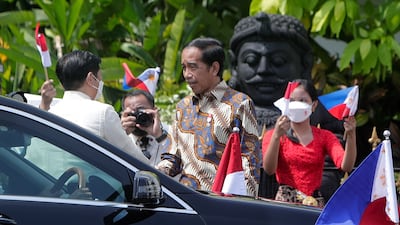Indonesian President Joko Widodo, commonly known as Jokowi, has a problem. He is due to step down in late 2024, when his second five-year term in office runs out, and the Constitution bars him from seeking a third. But his supporters want him to stay on. First, they made a clamour about trying to amend the Constitution so that Mr Jokowi could run again. Then, after their hero expressed little enthusiasm for the suggestion, saying repeatedly merely that he would obey the Constitution, they came up with another idea. He may not be able to run for the presidency again – but what about the vice presidency?
A spokesman for the country’s Constitution Court said Mr Jokowi could do so, and nothing in the Constitution specifically precludes it. Asked if Mr Jokowi could be his running mate in 2024, the assumed frontrunner Defence Minister Prabowo Subianto reportedly chuckled and said: “It’s a possibility.” If that is Mr Jokowi’s plan, he’s not letting on. “Who is this from?” he asked reporters recently. “I will explain if the [suggestion] comes from me. If it’s not from me, I don’t want to speak about it.”
This is reminiscent of the situation in the Philippines last year, when then president Rodrigo Duterte, also barred from seeking the presidency again, initially announced that he would run for the vice presidency in this year’s elections. He later thought better of it, and his daughter Sara went on to win that post in the May polls.
This is not to say that it is unsuitable for former heads of government to take up lesser posts after standing down from the highest office. It is actually quite common. One of Mr Duterte’s predecessors, Gloria Macapagal-Arroyo, became speaker of the House of Representatives of the Philippines a few years after having been president. A former British prime minister, Alec Douglas-Home, served as foreign secretary in the cabinet of his successor in the early 1970s. While in the 19th century, shortly after leaving the White House, former US president John Quincy Adams was elected as a congressman from Massachusetts and served in the US House of Representatives until his death.

But trying to become vice president to circumvent a rule preventing another presidential term sounds like seeking power by proxy. If, in either Indonesia or the Philippines, it is not against the law, it is almost certainly against the spirit of the law. And for long-term stability and good governance to become embedded and maintained, countries need not just laws but norms, including the idea of the “spirit of the law”, to become established.
The British constitutional historian Peter Hennessy calls this the “good chap theory of government”. This idea is that from politicians to civil servants, there is an ethos of respecting the system, even holding some of its traditions and procedures in awe, and of attempting neither to bend, break nor cynically misinterpret or seek a loophole in the rules.
This is what makes former US president Donald Trump’s continued refusal to accept that he lost the 2020 election so shocking. “Good chaps” certainly abide by the principle of “losers’ consent”. And this was one of the significant points about the 2018 general election in Malaysia. In developing countries, it can be a tricky moment when a governing party loses a national poll for the first time ever. Some of his opponents wondered if then prime minister Najib Razak would use his powers as head of the National Security Council to declare a de facto state of emergency. But he accepted the result, even though he knew one of the new government's first priorities would be to send him to jail. That was both entirely right, and no small thing.
By contrast, in neighbouring Thailand, the country’s Constitutional Court has just ruled that Prayut Chan-o-cha has not exceeded his constitutionally limited eight years in office, despite having been prime minister since 2014, saying that the counting only started in 2017, when the latest Constitution took effect. It is not for me to dispute the court’s ruling, but there are many who feel that the letter and the spirit of the law are at a disjuncture here. The bigger picture for the country is that, if it is going to mature as a democracy, the royalist-conservative establishment can't keep having coups every time a member of the Thaksin family wins an election. There might be legitimate concerns about the populist Thaksins, but they are also popular and they, or their proxies, have won almost every election since 2001.

Elsewhere in the region, adherence to the principle that no one is above the law is so strong in South Korea that it has become completely routine for former presidents to be jailed for corruption. That sounds impressive, although some worry about whether the law is in danger of being used as a political weapon.
The overall point is that constitutions, good practice and conventions need more than just the weight of the law to ground them hard and fast. They need to acquire a certain gravity and national status so that it should be unthinkable to try to flout them. This is especially so when a country’s military thinks of itself as a kind of super-constitutional guardian of the country – as has been the case at times in Pakistan, Myanmar and Thailand.
So Mr Jokowi needs to think very seriously about his cheerleaders’ proposal that he should stand to be vice president of Indonesia after his presidency ends in 2023. Much more would be at stake than his future proximity to power. His country is a young democracy, and it is important that its leaders continue to set an example.


